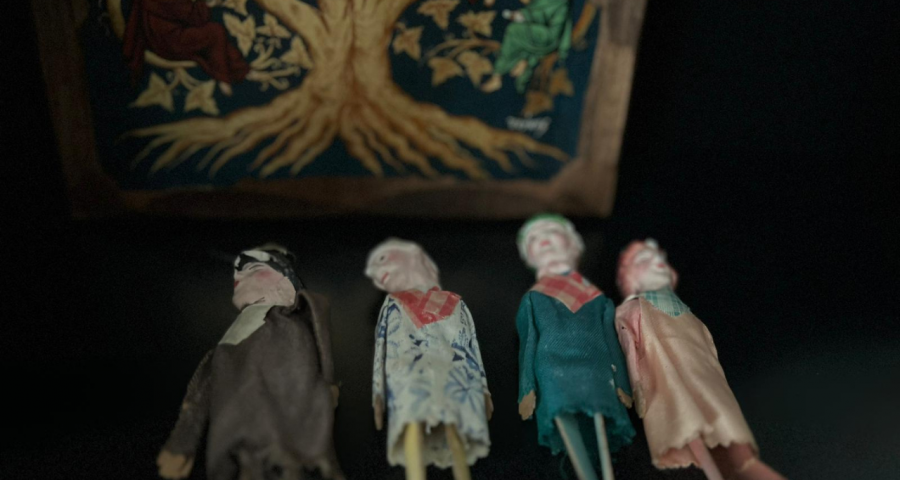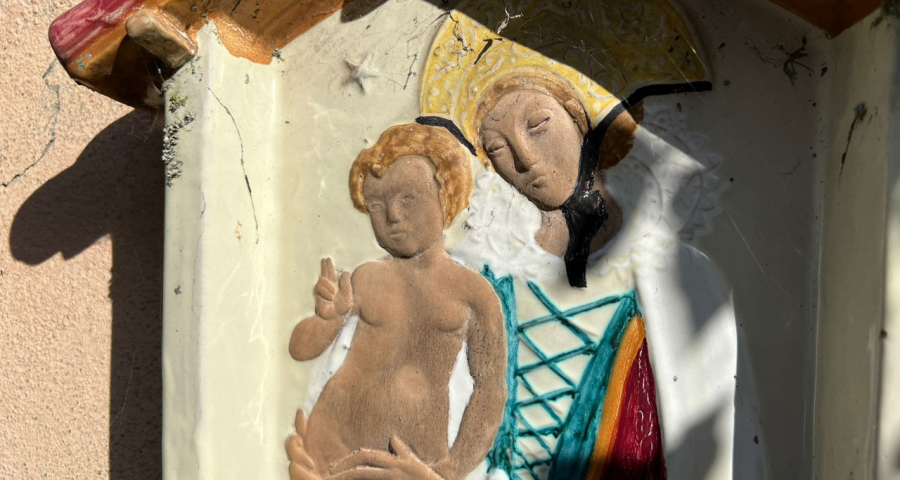CounterEconomy/7 - We should remember that God is above all agape and love, never «do ut des»
By Luigino Bruni
Published in Avvenire 16/04/2023
"The relationship between the taranta and Saint Paul was an extremely confused and contradictory one, in which Saint Paul, protector of the tarantati to whom grace was implored, coexisted with the Saint Paul who began the tarantate to punish sins and faults, and the Saint Paul-taranta exorcisable with music, dance and colours"
Ernesto de Martino, The Land of Remorse
The analysis on the cultural-economic effects of the Counter-Reformation continues. The serious effects of the commercial version of grace in the world of conceiving religion and civil life.
Religions are the first tool with which human beings have tried to defeat death, they are the great ordeal to make what is naturally not immortal. They are therefore the result of a great collective desire for the metamorphosis of death into something valuable, and sacrifice is the medium that ideally should operate this admirable alchemy. Thus, when plants or animals, destined by their nature to die, are sacrificed in the ritual, they leave the natural mortal order and enter a divine immortal one – herein lies the sense of the etymology of sacrifice: "to turn sacred". By killing life against nature on the altar, it is made immortal. This is also an explanation behind human sacrifices in ancient times: when offered to the gods they died sacrificially against nature and hence they no longer died in nature. Thus, «man constitutes himself as a prosecutor of death in the very bosom of natural dying» (E. De Martino, Magic, Ritual, Lament/ Morte e pianto rituale nel mondo antico, p. 236).
Ancient man saw nature die a partial but not definitive death, because the cycle of the seasons made what died in autumn "resurrect" in spring, and this suggested to him that somewhere something similar had to happen to men as well: «An old Dinca song laments that while the sun rises, passes and yet returns, and so does the moon, only man is born, passes and never returns» (De Martino, ibid). By giving living things to the gods, they leave time and enter eternity - we do not understand the ancient theology of consecrated life without this transformation and divinization of the gift of life, nor do we understand the profound meaning of mourning, that is, "procure for the deceased that second cultural death which avenges the scandal of natural death» (De Martino, ibid.)
With Christianity, however, something new broke into the world. Christ also overturned the logic of ancient religions: it is no longer we who offer our mortal gifts-sacrifices to the ruling divinity asking to make them immortal. In the Eucharist, that living synthesis of Christ's passion-death-resurrection, it is Jesus who, by giving himself to us in the form of bread, makes us share in the divinity. It is no longer our gifts that die in order to live forever, but it is God who by dying-rising gives us something true of his own immortality. The Eucharist is therefore the anti-sacrifice, it is the final word on the sacrificial logic, the good charis, a beautiful gratitude. It is all absolutely free because it is free from the commercial sphere. Herein lies the humanism of Christianity. In the practice of the Catholic tradition, however, especially starting from the Counter-Reformation, this absolute dimension of gratuitousness did not establish itself in the culture-worship of the people. People continued to interpret religion from a sacrificial perspective, where no grace is free: «'If you don't accept the hen, grace does not apply, and the child will be born blind'. "Grace is free," said Don Paolo. “Free graces do not exist,” replied the woman» (Ignazio Silone, Wine and bread). The Catholic reaction to Protestants' salvation by "grace alone" reinforced and amplified the religion's idea of "works" by which one must "deserve" salvation. Grace is not perceived as unconditional gratuity: someone has to profit from it, it must be earned.
Hence, even confession and consequentially the Eucharist were interpreted within the realms of a relationship of exchange between man and divinity. When reading the "Catechism of Pius X" (from 1905) for example, we immediately understand that the narrative of confession leads to interpreting penance as the price to pay to obtain the grace of forgiveness and therefore communion-Eucharist. The conditional nature of the absolution naturally places it in a juridical-economic-commercial context of do ut des: one of the «fruits that a good confession produces in us is the grace of God», which «makes us capable of the treasure of indulgences», indulgences which are too easily interpreted as the price to pay for «the remission of a temporal penalty» (Catechism, § 9). The Eucharist is therefore not perceived as a free gift, but as a response to our good works - grace does not work if we do not find ourselves in a state of grace first.
This contractual perception and narrative of grace as God's response to our meritorious works has produced much wider effects than just the interpretation of confession or sacramental life. Effects that are already very important in themselves, if we think of how deeply rooted approaches such as "I pay and then buy" to the sacraments still are in Catholic people. Naturally, theologians have said many other things regarding these narratives as well, things that made them more complex and in part even refuted them, but they did not generally reach the people.
Gratuitous-grace is therefore truly the central theme here. Because gratuitousness is precisely what prevents religions from being experienced merely as magic and superstition. Magic is the expression of man's eternal desire to take possession of the sacred, manipulate it and use it to his own advantage through words, gestures and thoughts. For millennia, the experience of the sacred has been the human reaction to the tremendum (Mircea Eliade), to the need to understand and try to manage forces that human beings perceived as supernatural and uncontrollable. The essence of magic is the sacred without gratuitousness, experienced entirely within an aspect of exchange – the economy was born from the world of magic and not vice versa. For this reason the Bible (especially regarding the prophets) has always been ruthless with the world of magic and divination, which it interprets as serious forms of false prophecy and idolatry.
From its earliest times, the Church has always had to contend with magic and superstition. Popes, priests, councils and theologians, therefore, have done and written a lot to protect the novelty of Christianity from the archaic forms of the sacred, in particular from magic. The Renaissance experienced a strong return of magical and esoteric practices on all levels. Before the Reformation, there had been authoritative interventions by top-level theologians and philosophers (from Erasmus of Rotterdam to Boccella, Querini, Giustiniani and Fregoso), who denounced the use of images of Christ, the Madonna and the saints used for various forms of magical rites with regards to rain, lightning, calamities, or for fertility. Those magical and idolatrous tendencies, which were already very present in the Middle Ages, were therefore growing in the sixteenth century and risked becoming a real epidemic - «My Saint Paul of the tarantate».
The Protestant Reformation was a traumatic and decisive event in this area as well. That internal process of criticizing magic and superstition underwent if not a total arrest (the condemnation of astrology continued, for example with Sixtus V), certainly a downsizing and a slowdown. The criticism of Luther and the reformers was in fact also centred on the idolatry and paganism of Catholic countries, accused of cultivating the adoration of fetishes (statues) and images in the "simple people", in a popular form of piety seen as superstition. This great and global Protestant attack on Catholic worship produced two main effects in the Catholic world: (a) a defence, by reaction, of the legitimacy of many forms of mestizo popular piety and religiosity, limiting itself only to the condemnation of grave excesses; (b) criticizing popular piety became a sign of heresy by those who did it. A third, equally decisive, element, was added to all of this.
The Church of the Counter-Reformation did not want to lose the relationship of control that it had with the "simple people" left at the mercy of their beliefs. Thus, it made its "pastoral" choice with the Council of Trent, which was also very different from the Protestant one. While, in fact, Luther's catechism was addressed to fathers of families, the pastoral reform of the post-Tridentine church was centred on the newly educated parish priests (Paolo Segneri) created by the new seminaries and the new religious orders. Books and documents were consequentially written for parish priests and well-trained religious persons who, in turn, had to form and prepare the simple people. The "political" choice of Trent was to train the educators, a second or third level mediation and pastoral care. Images, harmless nursery rhymes and litanies that were easy to memorize in the vernacular or in dialect (I still remember my grandmother's), were created for the benefit of the "simple people". The shepherds were formed, not the flock made up of the illiterates, the poor, the little ones, the women, the ignorant, the brutes, the boors – the institution of family is not even mentioned in the documents of the Council of Trent.
An important consequence of this choice was the inevitable paternalism in treating the "simple people". The natural consequence of paternalism is always a certain level of infantilism, that is, interpreting the relationship of the clergy with the faithful as that of fathers with their children - and when the stupendous evangelical reality of being the "children of God" becomes being the "children of the parish priests", the sense of God’s different form of paternity and of being his offspring is easily lost. In this context, mestizo/mixed or totally superstitious devotional practices were merely seen as "children being children" and therefore tolerated, as parents tolerate when children talk with their dolls. Children allowed to play within the realms of a minor religion, considered harmless in view "salvation" (the only thing that really mattered) and theologically harmless. Many good things were also done "for" the poor, as we will see in the coming articles, but rarely "with" the poor (because to do things with the poor you must first recognize them as adults). However, unlike children who above all live on gifts, the religious experience that the Catholic people had was dominated by an idea of God who when he does not intervene to free us from illness and poverty, it is due to our wickedness. The creation of oceans worth of guilt and fear, while those in charge of its management advised everyone to offer their pain to God. As a result, remembering, in this oikonomia, that God was above all agape and unconditional love became difficult indeed – and, in fact, many ended up forgetting it altogether.
Thus, while theologians continued to discuss the concepts of grace and conscience, the infant people cultivated their innocent popular piety, developing a "religion" of consumption. They continued to invoke the same ancient spirits, the only thing they had really changed was their names, sometimes not even the canopy used for the procession in their honour. At this point, we should not be surprised that once religion in a disenchanted world lost its ability to satisfy the taste of its consumers, these Catholic people, educated for centuries in a faith as children of lesser gods, passed without any delay from the sanctuaries to the shopping centres, from the evil eye to scratch cards, from the old (and serious) saints of the churches to the new "saints" of entertainment and new emotionally based sects.
One last note. The "simple people" occasionally had authentic spiritual experiences, because, thanks be to God, the free voice of the Spirit blows wherever it wants and the Spirit is the "father of the poor", it loves them very much. The history of Catholic countries, including its economic and political history, could have been different, however, if, while the educators were being trained, an attempt had been made to treat the poor as adults - because the poor are not children, they are not even "simple": they are only poor.













